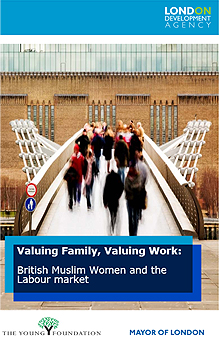
Author: Zamila Bunglawala
Publisher: The London Development Agency (research undertaken by The Young Foundation)
Release Date: November 2008
Pages: 65
Source: https://youngfoundation.org/wp-content/uploads/2013/01/Valuing-Family-Valuing-Work-British-Muslim-Women-and-the-Labour-Market-October-2008.pdf
This study draws on 2001 Census data, interviews with 50 ‘second generation’ Muslim women and other sources to examine employment issues facing Muslim women. It considers the factors of a ‘Muslim penalty’ resulting in high levels of economic inactivity for British Muslim women. It also considers the attitudes and perceptions that influence labour market entry and progression. The report makes policy recommendations to “increase the number of British Muslim women in the labour market, not least because British Muslim women represent 30% of the ethnic minority female working-age population”.
Zamila Bunglawala’s report helps to dispel some myths. Her interviews indicate that “there is little evidence to suggest second generation British Muslim women do not have support of their families or husbands to work. All (100 percent) of the women interviewed who work said they have the support from their families or husbands to do so. For women interviewed who do not currently work, 93 % of them said they want to work and that their families or husbands support their decision. Therefore, only seven percent said that they never want to work or do not have family support to do so”.
The interview findings, conducted in Manchester, Leicester and London, also challenge “misconceptions about where or what types of employment British Muslim women would be willing to accept. Our interview analysis found that 85 per cent of second generation British Muslim women who do not currently work want to work in mainstream jobs. Only 15 per cent said they want to work in ‘women only’ or ‘Muslim only’ work environments….another popular misconception is that British Muslim women are not prepared to travel to work…our analysis found that the 93 per cent of women not currently in work were prepared to travel for up to an hour to get to work”.
Given this willingness, what then is holding Muslim women back from participation in the labour market? The answer rests in a combination of Muslim religious and cultural preferences, lack of sources of advice, and prejudices at the workplace. Islamic values honour the role of the mother in a child’s early upbringing. According to the report, “Pakistani and Bangladeshi mothers (who make up 75 percent of British Muslim women) are far less likely to be in employment either prior to having a baby or during the early years of their child’s life than Indian, White or Black mothers”. However “many young women highlighted that while their preference was to stay at home before nursery and full-time schooling began for their children or to use informal childcare such as family and friends, they might choose to access formal childcare and remain in employment if the childcare was faith or culturally appropriate”.
Notwithstanding good educational qualifications, Muslim women face difficulties in finding employment because of “limited understanding of the labour market and being able to access and connect to it”. The JobCentre service is not proactive enough with their Muslim ‘customers’ – “none of the women in work interviewed secured their first job through help or support from the Jobcentre. The author believes that local community focused and faith based groups could also do more in the provision of support and advice.
The report’s section on religious discrimination notes that of women currently in work, “23 percent said they felt they were treated differently or encountered discrimination at interviews because they were Muslim. Thirty two percent said they felt they were treated differently or encountered discrimination while at work because they were Muslim. Forty three percent of women not currently in work said they felt they were treated differently or encountered discrimination at interviews because they were Muslim. These findings almost directly reflect the DWP analysis of between a quarter to half of the employment gap being caused by employer discrimination”. The hijab remains the most obvious marker for Muslim women – 50 percent of the Muslim women interviewed were hijabis – but other factors also come into play. As one interviewee noted, “I’m not a hijab wearerbut I think they could tell by my name..I was made to feel very uncomfortable socially at work but I didn’t want to get anyone into trouble….”
